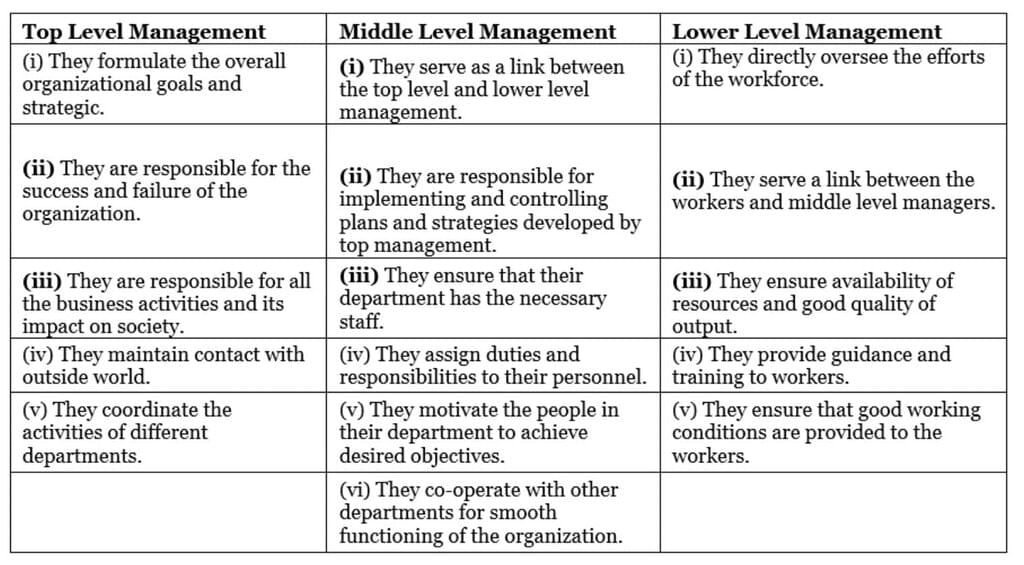Commerce Exam > Commerce Notes > Business Studies (BST) Class 12 > Short Notes: Nature and Significance of Management
Short Notes: Nature and Significance of Management | Business Studies (BST) Class 12 - Commerce PDF Download
Nature and Significance of Management Notes Introduction
- Definition of Management: Process of creating an environment for group work to achieve goals efficiently.
- Applies to all organisations (big/small, profit/non-profit).
- Science & Art: Structured knowledge (science) and practical application (art).
- Dynamic: Adapts to changing situations and times.

Characteristics of Management
- Goal-Oriented: Aims to achieve specific objectives using resources.
- All-Pervasive: Used in all organisations, regardless of type or size.
- Multidimensional: Includes management of work, people, and operations.
- Continuous: Ongoing process of interrelated functions.
- Group Activity: Involves teamwork toward common goals.
- Dynamic: Adapts to changing environments (e.g., McDonald’s menu changes in India).
- Intangible: Felt through organisational functioning, not seen.
Question for Short Notes: Nature and Significance of ManagementTry yourself: What does management aim to achieve?View Solution
Efficiency vs. Effectiveness
- Efficiency: Doing tasks correctly with minimal resources/cost (focus on process).
- Effectiveness: Achieving desired results on time (focus on outcome).
- Good management balances both for success.

Objectives of Management
- Organisational:
- Survival: Earn enough to cover costs.
- Profit: Ensure long-term success.
- Growth: Expand and stay competitive.
- Social: Benefit society (e.g., eco-friendly practices, jobs for the underprivileged).
- Personal: Align individual goals with organisational objectives.
Importance of Management
- Achieves group goals through teamwork and coordination.
- Increases efficiency by optimising resource use.
- Adapts organisation to changes for survival/growth.
- Helps individuals achieve personal goals.
- Contributes to society via quality products, jobs, and technology.
Management as an Art
- Features:
- Theoretical knowledge exists (e.g., marketing, HR principles).
- Personalised application varies by manager.
- Requires practice and creativity.
- Managers use knowledge, observation, and experience to apply principles creatively.

Management as a Science
- Features:
- Systematised body of knowledge.
- Principles from experiments/observations.
- Universal validity (broadly applicable).
- Inexact science; principles adjusted per situation.
Management as a Profession
- Features:
- Well-defined knowledge (e.g., IIM education).
- Restricted entry (exams for institutes).
- Professional associations (e.g., AIMA, no legal power).
- Ethical code of conduct (not mandatory).
- Service motive (client-focused).
- Not fully professional due to lack of mandatory restrictions.
Levels of Management
- Top Level: CEO, COO; sets goals, policies, analyses environment.
- Middle Level: Department heads; executes plans, coordinates, motivates staff.
- Lower/Supervisory Level: Foremen; ensures policy implementation, maintains discipline.

Functions of Management
- Planning: Deciding goals and methods in advance.
- Organising: Assigning duties, grouping tasks, allocating resources.
- Staffing: Hiring right people for jobs.
- Directing: Leading, motivating employees.
- Controlling: Measuring performance, ensuring plan adherence.
Coordination (Essence of Management)
- Definition: Synchronises management functions and departments to avoid duplication, delays.
- Characteristics:
- Integrates group efforts for unified goals.
- Ensures unity of action across departments.
- Continuous and all-pervasive process.
- Responsibility of all managers.
- Deliberate function requiring conscious effort.
- Importance:
- Manages growth in organisational size.
- Links functional differentiation.
- Coordinates specialised roles.
The document Short Notes: Nature and Significance of Management | Business Studies (BST) Class 12 - Commerce is a part of the Commerce Course Business Studies (BST) Class 12.
All you need of Commerce at this link: Commerce
|
51 videos|230 docs|49 tests
|
FAQs on Short Notes: Nature and Significance of Management - Business Studies (BST) Class 12 - Commerce
| 1. What is the nature of management and why is it significant in organizations? |  |
Ans. The nature of management involves coordinating and overseeing the activities of an organization to achieve defined objectives efficiently and effectively. It is significant because it helps organizations to plan, organize, lead, and control their resources in a way that maximizes productivity and ensures the achievement of goals. Management provides structure and direction, allowing organizations to adapt to changes in the environment and respond to challenges effectively.
| 2. What are the key characteristics of management? |  |
Ans. The key characteristics of management include goal-oriented, continuous process, group activity, multi-disciplinary nature, and dynamic function. Management is inherently aimed at achieving specific objectives, requires ongoing effort and adaptation, involves collaboration among teams, integrates knowledge from various fields, and must respond to changing conditions and environments.
| 3. How do efficiency and effectiveness differ in management? |  |
Ans. Efficiency in management refers to the ability to accomplish tasks with minimal wasted resources, such as time and money. Effectiveness, on the other hand, is about achieving the desired outcomes and meeting organizational goals. While efficiency focuses on the means (doing things right), effectiveness emphasizes the ends (doing the right things). Successful management balances both to optimize performance.
| 4. In what ways is management considered an art, a science, and a profession? |  |
Ans. Management is considered an art because it requires creativity, intuition, and personal skills to motivate and lead people effectively. It is regarded as a science due to the systematic study of principles and theories that guide management practices, utilizing data and analytics for decision-making. Lastly, management is viewed as a profession because it has established standards, a body of knowledge, and requires education and ethical conduct, much like other professions.
| 5. What are the different levels of management and their functions? |  |
Ans. There are typically three levels of management: top-level, middle-level, and lower-level management. Top-level managers are responsible for strategic planning and overall direction, making long-term decisions. Middle-level managers act as a bridge, implementing policies set by top management and overseeing lower-level managers. Lower-level managers focus on day-to-day operations, managing employees and ensuring tasks are completed efficiently. Each level has distinct functions and responsibilities that contribute to the organization’s success.
Related Searches
















